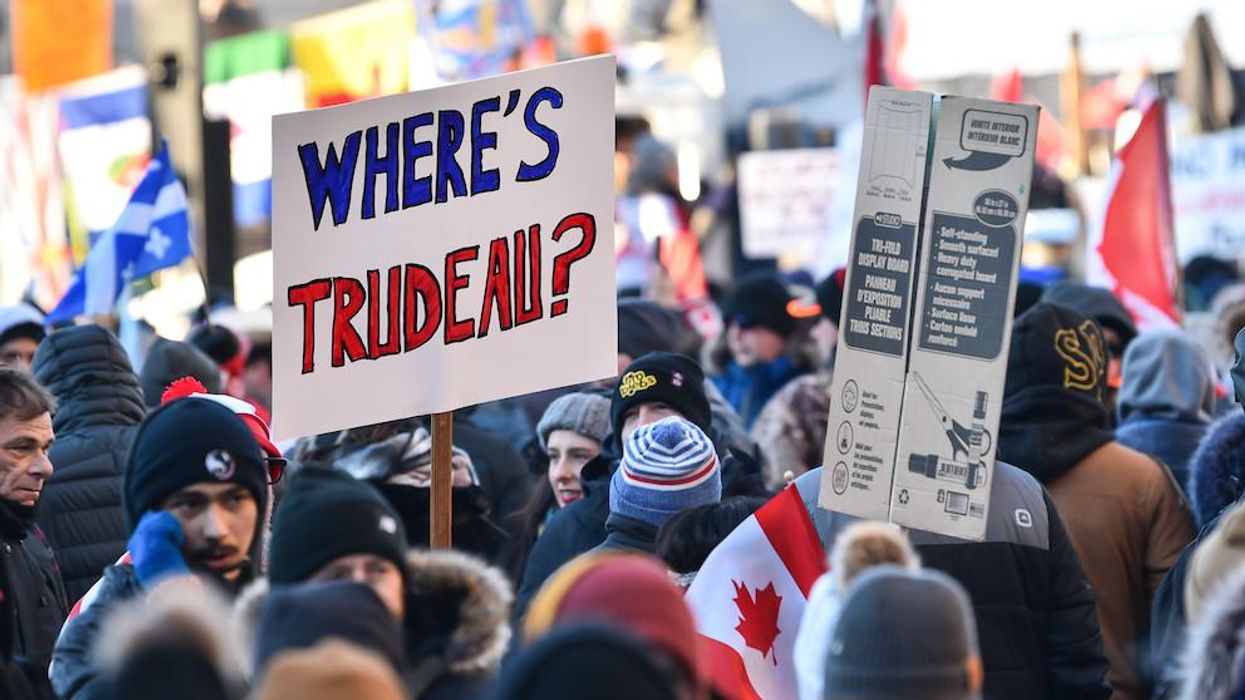
Photo by Minas Panagiotakis/Getty Images

It's no secret that Canadian Prime Minister Justin Trudeau really dislikes the truckers' Freedom Convoy currently clogging things up in the capital of the Great White North.
Trudeau, his government, and fellow leftists have verbally attacked the peaceful anti-mandate movement, labeled the protest an "insurrection" and a "siege," likened the truckers to terrorists, and accused protesters in Ottawa of being threats to democracy.
Monday, his government is activated never-before-used emergency powers to take down the truckers and anyone who would dare support them.
What Trudeau probably hopes most people won't remember is that just over a year ago, he was offering his and his nation's support for similar protests half a world away.
But not everybody has forgotten.
And now the New York Times editorial board has reminded the world that Trudeau is an outright hypocrite when it comes to peaceful protests that block the the streets of capital cities.
In a piece from the Times' editorial board Thursday, the paper called out Trudeau for backing a protest by farmers in India that clogged major roads in New Delhi while attacking his own citizens for a peaceful protest that has blocked roads in Ottawa.
When the Indian farmers kept traffic from moving on the capital's highways, Trudeau didn't rip them for being a danger to their people. Instead, he went out of his way to laud the protesters and say he had their backs — much to the chagrin of the Indian government.
"Canada will always be there to defend the right of peaceful protest," Trudeau declared, prompting India's foreign ministry to blast the remarks as "ill-informed," the BBC reported.
"Such comments are unwarranted, especially when pertaining to the internal affairs of a democratic country," ministry spokesman Anurag Srivastava said. "It is also best that diplomatic conversations are not misrepresented for political purposes."
The Times also noted that, "[b]y the standards of mass protests around the world, the 'Freedom Convoy' snarling Downtown Ottawa ranks [is] a nuisance."
"The number of protesters, about 8,000 at their peak, is modest; there have been no serious injuries or altercations, the truckers stopped blaring their horns after residents got a temporary court injunction against them, and most Canadians support neither the truckers nor their cause," the Times continued. "Yet what’s happening in Canada deserves close attention in the United States and across the world."
After explaining the truckers' cause and asserting that most people don't agree with the protesters, the Times blasted Trudeau's attitude and threats against the Freedom Convoy:
We disagree with the protesters’ cause, but they have a right to be noisy and even disruptive. Protests are a necessary form of expression in a democratic society, particularly for those whose opinions do not command broad popular support. Governments have a responsibility to prevent violence by protesters, but they must be willing to accept some degree of disruption by those seeking to be heard. The challenge for public officials — the same one faced by Minneapolis and other cities in 2020 during the protests after the murder of George Floyd — is to maintain a balance between public health and safety and a functioning society, with the right to free expression. Entertaining the use of force to disperse or contain legal protests is wrong. As Mr. Trudeau said in November 2020, in expressing his support of a yearlong protest by farmers in India that blocked major highways to New Delhi, “Canada will always be there to defend the right of peaceful protest.”
The convoy has captured an underlying frustration in a broad swath of the Canadian public. Like the “gilets jaunes” (yellow vests) movement in France that clogged the streets of Paris and other cities for months in late 2018 and early 2019, the Canadian truckers are motivated by anger over a wide variety of grievances that cannot be easily resolved through negotiations. Their power lies in their ability to disrupt through social media, using images of a few thousand people immobilizing a national capital and hampering international trade to mobilize global support.
The gilets jaunes, however, never found a cause with wide appeal. The Canadian truckers have, and their success in turning coronavirus restrictions into a rallying cry for the disaffected is what makes the Ottawa protest significant. In France, a convoy of dozens of trucks and other vehicles, inspired by the Ottawa protests, headed to Paris from southern France on Wednesday, prompting the police to announce a ban on such protests as a risk to public order. A U.S. group calling itself “Convoy to D.C. 2022” has announced an American version of the protest for next month, though Meta quickly removed the group’s page from Facebook for violating its policies on spreading vaccine misinformation.
The situation is an important learning opportunity for Trudeau, as well as President Joe Biden, the Times noted.
"Effective leadership in this stage of the pandemic means finding ways to confront the understandable frustrations and legitimate protests engendered by the pandemic without stoking more strife, compromising the rule of law or succumbing to unreasonable demands," the paper said, adding, "Allowing nonviolent, even if disruptive, protest is an important tool for maintaining social cohesion in a polarized society."